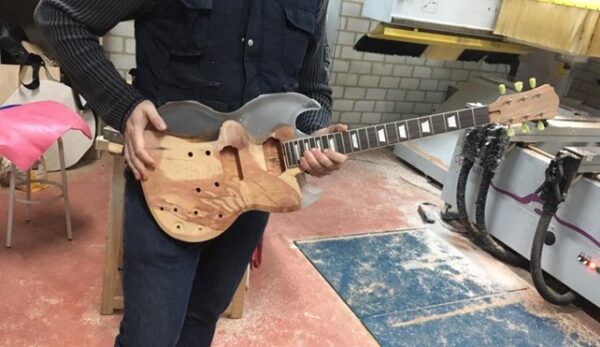
When crafting stringed instruments, luthiers typically opt for traditional materials like poplar, ash, maple, or rosewood. Carpentaría Lambar’s craftsmen took a slightly less conventional approach by using epoxy to create this guitar.
Carpentaría Lambar, located near the city of Burgos in Northern Spain, is not your typical carpentry shop. These skilled artisans have taken a fresh approach to woodworking, combining modern materials with carefully selected wood to create unique and eye-catching pieces. Their designs have also set them apart in the world of interior design, where their work has gained quite a following.
Alberto Costillas, President of the Cooperative, says the initial idea to create this guitar with epoxy came from their friend Juan Carlos, who plays in a rock band.
At Lambar, the carpenters had been wanting to work with epoxy for years. With the help of their trusted supplier Hegardt, they were introduced to Entropy Resins. Since then, Carpentaría Lambar has embraced epoxy without hesitation.

So…how can epoxy transform your guitar building process? Well, one of the primary benefits of epoxy is its ability to stabilize wood. Guitar necks and bodies often suffer from warping due to changes in humidity and temperature. By encapsulating the wood with epoxy, carpenters can prevent warping and ensure long-lasting stability. It acts as a powerful adhesive, bonding different guitar components securely as well as allowing luthiers to create intricate inlays. Whether you’re attaching the neck to the body or reinforcing delicate joints, epoxy ensures structural integrity.
Want a guitar with a unique pattern or color scheme? Epoxy makes it possible. Mix pigments, dyes, or even metallic powders into epoxy to create striking designs.
This guitar, crafted from juniper wood, is ideally suited for pairing with epoxy due to its workability and durability. For this project, Entropy Resins Clear Casting Epoxy was used with the Slow Hardener. The casting was cut and milled using a pantograph to achieve the desired shape.
The guitar’s design leans towards a rock aesthetic, crafted with the intention of being used by Juan Carlos.Now that the team at Carpentería Lambar has gotten their hands on Entropy Resins, they’re finding it easy to work with and extremely versatile.
After trying several brands and losing a lot of time and money, Entropy Resins was perfect for us and works like a charm.

